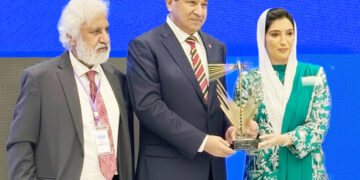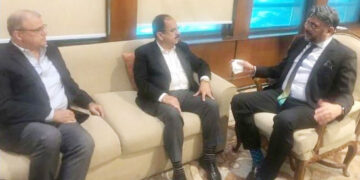Karachi: More than 1.3 billion people around the world are suffering from high blood pressure (hypertension) causing death to every fifth person. 46% of the population of developing and middle-income countries, including Pakistan, do not know that they have high blood pressure. In Pakistan, ten percent of women suffer from high blood pressure during pregnancy.”, Health experts shared these views while speaking at a seminar organized by Dow Institute of Cardiology, held at Dr. Abdul Ghaffar Billu Lecture Hall, named “Hypertension- A silently growing epidemic. How to kill the silent killer?”


From the Seminar, Principal Dow International Medical College Prof. Zeba Haque, Director National Institute of Diabetes & Endocrinology Prof. Akhtar Ali Baloch, Director Office Of Research Innovation And Commercialization Prof. Kashif Shafiq, Medical Superintendent Dow University Hospital Prof. Jahan Ara, Head of Cardiology Dow University Hospital Prof. Tariq Farman, Prof. Nawaz Lashari and others also spoke, while a large number of teachers and students were also present.


The chief guest, Principal Dow International Medical College Prof. Zeba Haque, said in her address that high blood pressure is not an epidemic, but the rapid spread of this disease becoming an epidemic. She said that awareness is needed to prevent the rapid spread of high blood pressure. Using various modern means, people should be told how they can avoid this disease and what steps to take in case of contracting the disease. At the beginning of the seminar, in the lecture entitled “How blood pressure is becoming an epidemic”, Professor Kashif Shafiq said that 46 percent of people in Pakistan dont even know that they have blood pressure, 20 percent of people know that they have high blood pressure but they are not taking any treatment. But those who are taking treatment, one in five have it under control, the rest are out of control. High blood pressure increases the risk of stroke, various Cardio vescular diseases like heart attack and heart failure. Around 8.5 million people die due to this deadly disease all over the world. He said that the number of cardiovascular diseases (CVD) has doubled in Pakistan as well. In the last thirty years, if we only take hypertension to compare the data from 1990 to the data from 2019, we find that this data has almost doubled. We have no inclination towards disease prevention due to which its number is increasing rapidly. No effort is being made to prevent this hypertension in Pakistan. Most patients in Pakistan go undiagnosed, leading to heart disease. He said that our focus should be on the stability of our protection, should be on increasing our immunity, in which first of all we should change our lifestyle by giving preference to low-fat food, using minimum amount of salt in food, controlling weight and having regular physical activity, try to minimize cigarettes in the first phase and completely quit smoking in the second phase.
Professor Jahan Ara said that in a developing country like Pakistan, the ratio of high blood pressure is 37% in men and 39% in women, therefore high blood pressure is the second major cause of death among women worldwide. He said that 58 percent of women between the ages of 65 and 74 suffer from high blood pressure. After menopause, blood pressure increases more in women than in men. He said that obesity in women is also a big risk factor in high blood pressure.
Dr. Tariq Farman said that to fight blood pressure disease on a war footing and to save our people, we have to train all students and nurses to deal with this disease. Professor Iftikhar, Director of the Institute of Chest Diseases also addressed the event. He said that it is important to make patients fully aware of the disease and continuous supply of medicines at affordable prices can help control the disease. Professor Javed Akbar Siyal, President of Pakistan Cardiac Society also participated in the seminar and said that Pakistan Cardiac Society is training the general public and young doctors to deal with the disease through continuous awareness program. At the end of the seminar, the organizers presented a bouquet to the chief guest, Prof. Zeba Haque, while Prof. Zeba Haque presented certificates and awards to the speakers.



















